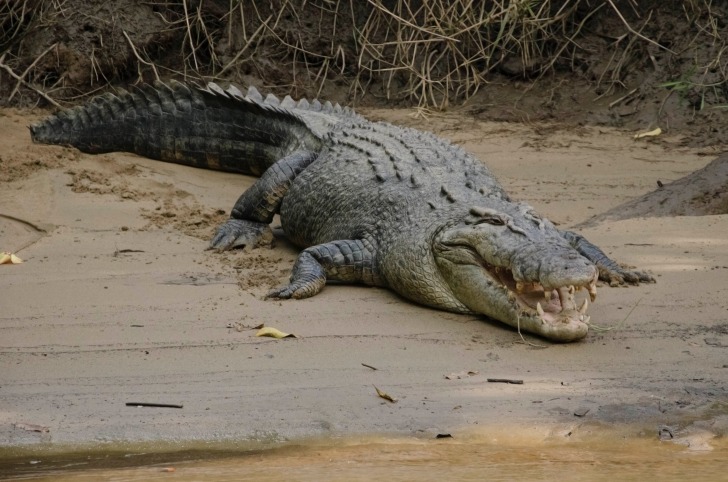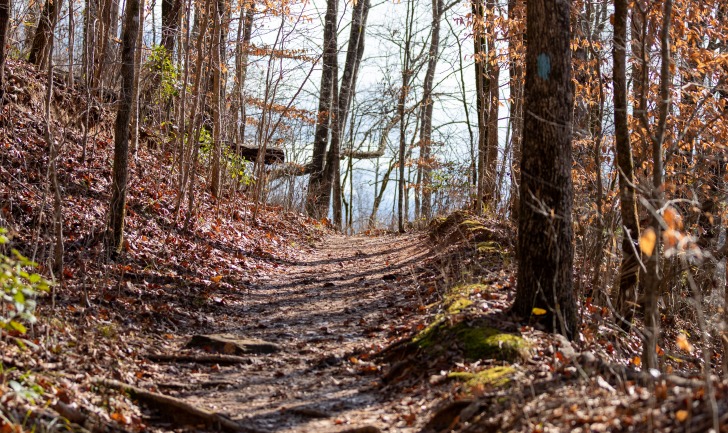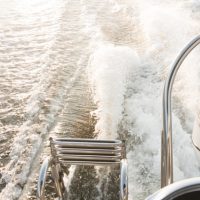Lake Oconee is a relatively new lake in central Georgia, south of Athens.
It was built in 1979 and is just above what is called the fall line, which is where the land drops off quickly.
That line was once the edge of the Atlantic Ocean, and it creates a barrier for many forms of wildlife.
Contents
So… Are There Alligators in Oconee?
There are a few alligators that make their way to Lake Oconee, but they are rare.
The Oconee River, which flows into the lake, has plenty of alligators but they usually don’t get to the lake.
The reason is the fall line.
The land rises overall and the weather is different enough north of the line to discourage alligators from coming.
The small Apalachee River also flows into the lake but has no alligators.
Alligators don’t know about this line, so they go up the river and into the lake at times.
For the most part, they stay in the river, downstream of the lake.
When they are spotted, fish and wildlife people try to capture them and move them back down the river where they normally live.
There are about 200,000 alligators in Georgia and they all live below the fall line.
It is possible one could cross that line and get into the lake, but it is so rare that if one is even spotted it makes the news.
Alligators would not be able to live there year-round even if they do occasionally get to the lake.
People also take baby alligators as pets at times.
At some point, the alligator gets too big to take care of, and they dump the animal into a lake or river.
This is how alligators sometimes show up in areas where they should not be.
This has not happened at Lake Oconee yet, but it is something that could explain how one got there if one is found.
Alligator Species in Lake Oconee
Alligators are very rare at Lake Oconee, but when one does show up, you can bet it’s an American alligator.
The American alligator is one of two species of alligator in the world, the other one lives in China.
American alligators live in low-lying coastal areas from Texas to Virginia.
Lake Oconee is just a little out of reach of their current domain.
Is it Safe to Swim in Lake Oconee?
Lake Oconee is a great place to swim and it is very safe.
There are two rivers flowing into the lake, and neither passes through a large city, so they are relatively free of pollutants.
The water is clear almost all the time too.
Boating accidents are the most common cause of injury or death on Lake Oconee, and there are not many of them.
Even so, there were two people who drowned in separate incidents on the same day in July of 2022.
Since it is a relatively new lake, there may still be some debris in the water, and that can be a danger.
Avoid diving into water when you cannot see the bottom of what you are diving into.
People also fall into the lake at times and drown.
Accidents like that are the greatest danger for swimmers in Lake Oconee.
There was also a death caused by a boating accident in 2021.
Interesting Alligator Facts in Lake Oconee
Alligators live in the Oconee River, which flows into Oconee lake.
Because of the fall line, there is very rarely an alligator in the lake.
The fall line goes across the Carolinas, Georgia, and Alabama, and is where there is a quick change in the topography.
This creates a lot of waterfalls, and it was once the bank of the Atlantic ocean.
This also creates a natural barrier for creatures like alligators.
While they probably won’t find one at Lake Oconee, Georgia has operated a lottery system to allow people to hunt alligators since 2003.
People apply for the hunting license and a certain number are selected each year for the month-long hunt that is usually in the fall.
Alligators store fat in their tail, and they can survive on that for a very long time.
They do not eat every day, and sometimes only eat about once a week.
They can go a year without food if they have to, but they do have to have water.
When the water gets cold, alligators enter a state of brumation, which is similar to hibernation.
Their body slows down a lot and they barely move.
They do not eat but they do drink in this stage.
When the water warms up, they come out of that state.
Alligators can live for 60 years, and scientists believe the brumation process helps with their longevity.
Alligators were once an endangered species, but they have recovered and the population is growing.
They prefer living on the coast, but they are making their way inland in some areas.
The fall line remains a big barrier.

Alligators vs. Crocodiles
Any alligator close to Lake Oconee is going to be one of the two species of alligator, and that is the American alligator.
Alligators are part of the Crocodilian family.
They are similar to crocodiles, but there are some significant differences.
All alligators are crocodiles, but not all crocodiles are alligators.
Here are the differences.
Color
Alligators are black or gray with a light underbelly.
Crocodiles are olive-green to tan, and also have a light underbelly.
Mouth
Alligators have a rounded snout, and their teeth are hidden when the mouth is closed.
Crocodiles have a more pointed snout, and their teeth are visible when their mouths are closed.
Teeth
Alligators have about 80 teeth.
Crocodiles have a more ordered set of 66 teeth.
Both have new teeth that grow back to replace the old ones when they are broken or worn down.
Bite
Alligators have a strong bite of 2700 pounds per square inch
Crocodiles have the strongest bite of any animal that exists, biting with the force of 4,000 pounds per square inch.
Humans bite at about 150 pounds per square inch.
Habitat
They both live in coastal areas and in marshy wet areas.
Alligators are freshwater creatures and don’t like salt water.
Crocodiles like salt water and are comfortable in both.
Size
Alligators can grow up to 1,000 pounds and 12 feet long, though most are around 800 pounds and 10 feet as adults.
Crocodiles can be up to 2,000 pounds and 20 feet long.
Feet
Alligators have webbed feet and are better swimmers.
Crocodiles do not have webbed feet but have strong feet that can hold onto the ground.
They can swim but prefer dry land.
Range
Alligators live in the southeast United States and in China.
Crocodiles live along the equator around the world.
The southern tip of Florida is the only place in the world where you can find both.
3 Safety Tips for Swiming in Alligator-infested Waters
It is rare for there to be an alligator at Lake Oconee, and you will likely never encounter one while swimming there.
There are still dangers involved in swimming, however, and here are three ways to stay safe in the water.
- Be mindful of boats. Boating is not the same as swimming, but boats are the cause of most injuries at the lake. Don’t swim around boats. If you are on a boat, wear a safety flotation device.
- Don’t take chances. A young man was killed in the summer of 2022 while diving in Lake Oconee. There can be objects under the water that you cannot see. Don’t dive where you cannot see the bottom, or where you do not absolutely know for sure the depth of the water.
- Avoid drugs and alcohol. Drugs and alcohol may give you a false sense of your ability while under the influence. They can also alter your motor skills and inhibit swimming.
Summary
Lake Oconee is a relatively new lake, built in 1979.
It is just above the fall line, which makes it a place an alligator is not likely to be.
There are alligators not far away on the Oconee River, but the change in altitude and weather makes the lake a place an alligator would not like.
There is one found now and then, and wildlife officials try to move it back to the river.
Frequently Asked Questions
Are alligators endangered?
No, but they once were.
Due to overhunting, they almost became extinct and were put on the endangered species list in the late 1960s.
They were over-hunted for their skin, which could be made into leather, and for food to some degree.
Alligator hunting became illegal, and wildlife officials helped restore the population with good conservation practices.
Alligators were taken off the endangered list in 1987 when their population had grown to where it could sustain itself.
They have grown to the point of being a nuisance in some areas.
Most states now have a controlled hunt that hands out licenses with a lottery system.
What should you do if you see an alligator?
Wildlife officials say you should stay 50 feet away.
Alligators are very quick over a short distances, but they cannot run for long.
If one starts coming toward you move in the opposite direction fast.
Do not try to interact with an alligator in any way.
They very rarely eat a human, but one could bite your arm or leg off easily.
Mother alligators are also fierce defenders of their young, so you should not get anywhere close to small alligators.
Do not get in the water if you see an alligator in the water.
Alligators along a river bank are basking in the sun.
As long as you stay 50 feet or more away, they probably will not notice you and will not be a danger.
Do alligators make good pets?
No, they never make good pets.
They may be cute as babies, but they will get very big.
At some point, they will get too big to handle or feed.
Alligators cannot be tamed, and even professional trainers have a hard time training them.
Alligators need a lot of space too, and you won’t likely have a pool big enough for them.
Alligators are dangerous creatures and should not be kept as pets.
Sometimes people set alligators free in lakes or rivers, which is illegal and dangerous for both the alligator and other people.
Why is it bad to feed alligators?
When alligators receive food from people, it makes them bolder as far as approaching people.
They will start to associate food with people and will expect it to be given to them by other people.
Alligators are wild animals and they could attack you in some situations.
It is not good for the alligators and it is dangerous for people who feed them.
Keep in mind too, that if you clean the fish you caught, and throw the scraps into the water, you are in essence feeding the alligators.












The American alligator is the only species of alligator in North America, and it lives in freshwater areas.
It is very rare for an alligator to be found at Lake Oconee, but swimming can still be dangerous.
Alligators are rare in Lake Oconee due to the fall line and their preference for living below it, but occasional sightings occur and they are promptly relocated by fish and wildlife officials.